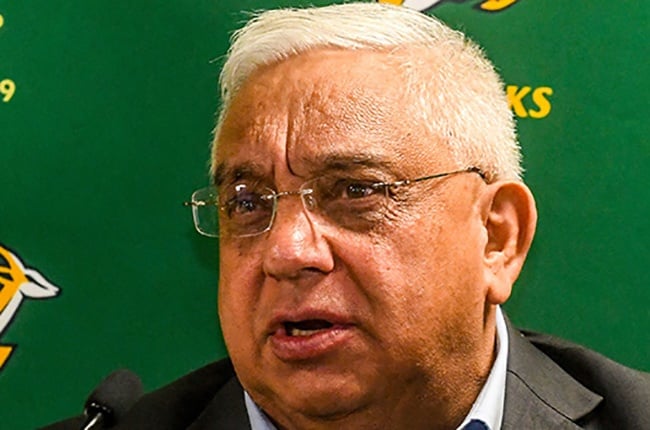


SA Rugby president Mark Alexander during the South African national rugby team arrival media conference at OR Tambo International Airport on 5 November 2019 (Photo by Sydney Seshibedi/Gallo Images)
- SA Rugby president Mark Alexander acknowledged that the sport had failed to open doors for black coaches.
- Forty-nine former Springboks, coaches and administrators wrote a statement criticising the sport for the lack of opportunities in leadership positions in the game.
- The list of the 49 disaffected rugby figures included former Springbok coach Peter de Villiers and former SA Sevens mentor Paul Treu, as well as Boks Ashwin Willemse and Adrian Jacobs.
SA Rugby president Mark Alexander, the leader of a sporting code that’s continuously is under fire for its slow pace of transformation, admitted on Wednesday that rugby had failed to provide opportunities for black coaches.
On Tuesday, 49 former Springboks, coaches and administrators wrote a statement supporting Black Lives Matter (BLM) and Proteas cricketer Lungi Ngidi’s stance on the worldwide movement.
In the statement, the group which includes former Springbok coach Peter de Villiers and ex-Blitzboks coach Paul Treu was scathing on rugby’s closed doors to black South African coaches at pristine national, franchise and provincial union jobs.
They voiced their disapproval at:
- 100% exclusion of Black Head Coaches at Springbok, SA Under-20, PRO14, Super Rugby and Premier Currie Cup.
- 100% exclusion of Black CEOs.
- 100% exclusion of Blacks as High-Performance Managers.
Indeed, none of the six franchises – Bulls, Stormers, Sharks, Lions, Cheetahs and Southern Kings – have a black head coach or director of rugby. SA Rugby’s director of rugby (Rassie Erasmus), high performance manager (Louis Koen), Blitzboks head coach (Neil Powell), Springbok head coach (Jacques Nienaber), SA Under-20 head coach (Chean Roux) are all white males. Stanley Raubenheimer (Springbok Women), Lance Sendin (SA Schools/Under-18) and Laurian Johannes (SA Women’s Under-20) were the only black head coaches within national team structures, with Johannes the first woman to get such a position.
While he referenced the national team as proof of what can be achieved with a racially united and diverse team – the Springboks winning the 2019 Rugby World Cup with Siya Kolisi as captain – Alexander acknowledged the failures elsewhere in key leadership positions in rugby.
“The Springboks proved in 2019 that diversity is a strength of our country and our sport, thanks to a diverse team and management structure. But there has undoubtedly been a failure to provide opportunities for black coaches,” Alexander said.
“Although there have been occasions when all four senior national teams have had black coaches, we would agree that the appointment and promotion of black coaches across the board has been inadequate. We have publicly expressed our concern about this failing on several occasions in the recent past.
“The question is: what are we doing about it? We believe our Strategic Transformation Plan (STP) made encouraging strides up to 2019 in transforming playing squads, culminating in the Springboks’ Rugby World Cup squad. The same targets were set for coaches with much less success, we acknowledge.”
Alexander leaned on it its new Strategic Transformation Development Plan 2030 (STDP 2030), one of many such policies that have yielded incremental transformation results since 1994, in the hope that provincial unions and franchises would give equally and sometimes better-qualified black coaches the same opportunities.
“That process has been renewed in our Strategic Transformation Development Plan 2030 which charges our members and national structures to accelerate the appointment of black coaches with a target that aims at a minimum target of 60% of black coaches across the board by its conclusion.
“To drive that process the Rugby Department had developed a fast track programme for black coaches before Covid struck. It will not be allowed to gather dust. All our members have signed up to the STDP 2030 plan. It is now up to us to deliver.”
Although SA Rugby has attempted fast-tracking young black coaches within their age-group ranks in the recent past, such as Mzwandile Stick, Mziwakhe Nkosi, Phiwe Nomlomo and Bafana Nhleko, the top provincial jobs have remained exclusively in white coaches’ hands.
De Villiers and Allister Coetzee remain the only black Springbok coaches in the past 26 years and there appears no immediate black addition to that list because of the long queue of esteemed black coaches without franchise positions.

